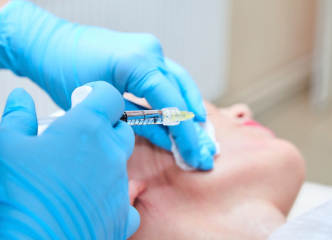“Get involved” and be a part of building a brighter future for injured people |  | Making a positive difference for victims of negligence is one of the many reasons to join the APIL executive committee, the association’s president Jonathan Scarsbrook explains in a new short video.
It comes ahead of the opening of the APIL officer elections next month, as reported in last week's Weekly News.
Jonathan sits down to talk about his route on to the executive committee, his duties, and the benefits to him as an individual, and also for his firm. Watch the video here.
Jonathan describes his role as an APIL officer as ‘a privilege’ and ‘extremely important.’
He references the great learning experience and opportunity to make connections, as well as having a hand in effecting change in the legal system.
“Rather than sit back and be frustrated, which we all can be at times, why not get involved and try to make a difference?” he says.
Members who are eligible to stand for the vacant positions (president, two vice presidents, and secretary) will receive an email on 9 January from Mi-Voice electoral services. If you would prefer to stand for an additional officer position there will an opportunity to do so when additional officer nominations open on 13 February.
| | Christmas and New Year opening |  | Weekly News will be taking a break over the Christmas and New Year period, returning on Thursday, 11 January 2024.
APIL’s office closes on Wednesday 20 December at 5pm and will reopen on Tuesday 2 January 2024.
We would like to take this opportunity to wish all APIL members a merry Christmas and a happy New Year.
| | Insurance is vital when cosmetic procedures go wrong |  | It is vital people carrying out non-surgical cosmetic procedures, such as chemical peels and Botox injections, have the correct insurance to protect customers when things go wrong, APIL said this week.
Practitioners need to have mandatory public liability insurance, as well as treatment risk insurance. These will ensure businesses have the appropriate level of cover to meet a claim if negligent treatment leads to a customer being injured, APIL has told the Department of Health and Social Care. Read the full consultation response here.
“At present victims of poor treatment, which can cause serious and sometimes permanent injuries, cannot always secure the redress they need to get their lives back on track because the person or business that carried out the procedure is not insured correctly,” said APIL executive committee member Guy Forster, in a press release.
APIL has received enquiries from journalists who would like to raise the profile of injuries sustained by non-surgical cosmetic treatments but need examples of real injured people. It need not be the case that the practitioner was insufficiently insured. Members who have clients who would be willing to share their experiences should contact APIL’s press and communications officer Julie Crouch as soon as possible at julie.crouch@apil.org.uk.
Meanwhile, a Conservative MP has introduced a Bill which would require ‘companies and certain other persons to insure against their liability for injury to third parties and premises’.
Natalie Elphicke, the MP for Dover, introduced the Public Liability (Compulsory Insurance) Bill as a Private Members’ Bill on Monday, 11 December. Private Members’ Bills are introduced by backbench MPs, but most never become law.
The text of the Public Liability (Compulsory Insurance) Bill has not yet been published, and the MP has given no details other than a short explanation of the purpose of the Bill, which can be read here.
The Bill has been listed for debate on Friday 15 March, but with six other Private Members’ Bills due to be debated first on that day, MPs might not even get the opportunity to debate the Bill. APIL’s campaign team however, will review the Bill when it has been published, and brief MPs with its views on the Bill ahead of a possible debate.
| | Travel company regulations compliance call |  | APIL has called for an independent body to be created to enforce compliance with regulations among travel company operators.
The association has raised the issue in its response to a Government consultation proposing reforms to the Package Travel Regulations 2018. Tour operators should be penalised for failing to provide accurate information to consumers or meet their obligations under the regulations, APIL said.
In its reply to the Department of Business and Trade, the association also opposed plans to exclude UK-only package holidays from the regulations, as this would strip consumers of essential protections in relation to information, insolvency coverage, and service quality.
APIL argued against the proposal to set a minimum cost threshold for the regulations to apply to packages because this would create inequalities among consumers based on package prices.
The definition of linked travel arrangements (LTAs) should be simplified, APIL suggested. Consumers are still confused about the differences between a package and LTA, and the level of protection these arrangements provide.
APIL also argued against the exclusion of business travellers from the regulations' scope.
Members can read the full consultation response on APIL’s website here.
| | APIL rebuts “ill-informed” remarks about compensation |  | A national tabloid news article this week prompted APIL to rebut the myth of a “compensation culture”.
The association has a zero-tolerance policy in relation to use of the phrase in news articles, and has seen a noticeable reduction in recent years.
This week however, an article in the Daily Star about compensation paid to children who have been injured at school led to the association’s press team sending a clarification to the newspaper.
In the article, for which APIL had already provided comment, the chairman of the Campaign for Real Education said that “ambulance-chasing lawyers are running a money-making rip-off of public funds”. He added that most claims are not legitimate.
“Comments from the chairman of the Campaign for Real Education’ are ill-informed and out-of-touch,” said APIL president Jonathan Scarsbrook.
“Compensation is not paid to children who are injured in the ordinary ‘hustle and bustle’ of school life. Certainly, no parent expects their child to come home from school with broken bones - that is not part of the school curriculum.
“Compensation is paid for genuine injuries which are caused by negligence and which are entirely avoidable,” he said.
| | House of Lords urged to act on PI cold calls |  | Cold calling and spam texts for personal injury claims should be banned once and for all, peers have been told ahead of a debate next week.
In a political briefing sent to members of the House of Lords, APIL has said that cold calls and spam texts which encourage people to make a claim are still a problem for the public. A YouGov survey commissioned by APIL earlier this year found that in a 12-month period, 38 per cent of UK adults received a personal injury cold call or spam text.
APIL has urged peers to amend the Data Protection and Digital Information Bill to introduce an outright ban. The Bill will have its first debate in the House of Lords on Tuesday 19 December.
Claims management companies (CMCs) are still allowed to cold call, as long as they adhere to certain rules on consent. There is however, strong support for an outright ban, with 95 per cent of people who received a cold call in favour of a ban.
APIL’s briefing to peers can be read here.
| | Appeal for employee assistance cases |  | A national investigative radio show wants to speak to any personal injury practitioners who have brought cases for claimants over the impact of Employee Assistance Programmes.
Producers would like to hear about people who have suffered poor mental health or wellbeing as a result.
The BBC documentary show says cases might include those involving a mental health support programme paid for by the claimant’s employer which resulted in a wellbeing issues or medical negligence case.
Any members, or colleagues of members, who can help should contact Jane Hartwell, APIL’s communications manager, in the first instance. Email Jane at jane.hartwell@apil.org.uk.
| | Serious injury collision insight needed |  | There is still time for members in London to respond to a call for evidence about police investigations of serious injury collisions.
Anyone with knowledge or experience of serious injury collisions in the capital is invited to submit views to a London Assembly Police and Crime Committee call for evidence, which closes on Friday 22 December. The committee would particularly like to hear from those affected by serious injury collisions, including road crash victims and their solicitors.
One of the key questions discusses the impact of police investigations on civil claims. You do not need to answer all the questions. Any input you can provide would be valuable.
The call for evidence can be found here.
| | Online conversations this week |  | | | Keep your e-scooter off the public roads |  | APIL chief executive Mike Benner’s latest blog reminds the public that privately owned e-scooters are still not regulated.
Mike said: “Private e-scooters are still illegal to ride on public roads, and yet, given the number of people doing exactly that, this law has either been badly communicated or poorly enforced.
“In 2022 alone, 12 people were killed by e-scooters, and a further 1,480 people injured - both all-time highs for the UK. These damning statistics underscore the serious need for a regulatory framework that addresses the risks of these newly popularised machines.”
Mike also sets out APIL’s position on e-scooter regulations. You can read the blog here.
APIL will be posting about the matter on its social media channels. To find this, and more, search injuredpeople on Instagram or Association of Personal Injury Lawyers on LinkedIn. Alternatively, we are @APIL on X.
| |
|